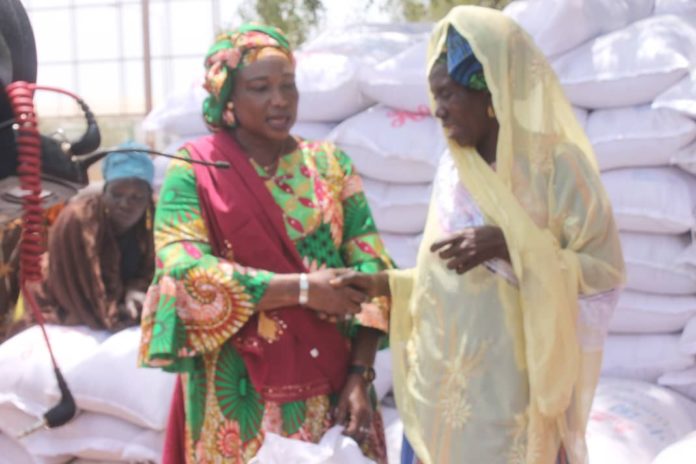Abdoulai G. Dibba
The Ministry of Agriculture on Saturday June 8th 2019, handed over 324 bags of rice to 162 women winnowers of groundnut shells at Saro.
The handing over which was presided over by the new Minister of Agriculture Amie Fabureh, was moderated by the Deputy Permanent Secretary Musa Houma.
In his statement as the moderator, DPS Houma said the rains of 2018 started during the first part of June and was followed by a dry spell with scanty rain fall in the month of August; that this eventually halted the sowing of major crops and further threatened the successful germination of the seeds already sown; that as a result of this, a multi institutional rapid assessment of food need was carried out followed by a joint Gambia Government\FAO\CILLS and WFP pre-harvest assessment, which established that eighty-three thousand, eight hundred and seventy-two(83,872) people across the regions, were in need of immediate food assistance.
Houma said the People’s Republic of China donated 2,734 metric tons of parboiled rice to the Republic of the Gambia, and that the Minister consulted them in order for the vulnerable women at Saro to benefit.
“As a result, I came here and registered 162 vulnerable women who are to receive two bags of rice each,” DPS Houma said.
In her statement, the new Minister of Agriculture stated that the women at Saro are part of society; that what these women are doing at Saro is part and parcel of Agricultural activities. She said the women at Saro are vulnerable and the donated rice is for farmers and vulnerable families such as the women at Saro, who seek their livelihood by winnowing groundnut shells.
Minister Fabureh assured the women that their efforts in maintaining their families through their labour, was noted by the Government; that they also have a share in every donation meant for the vulnerable of the country, to support their families. She further asked the beneficiaries to eat the rice because it is full of all nutrients and is of high quality. She asserted that the date on the bag is the production date of the rice and not the expiring date. She concluded that the rice is parboiled and is better than the rice on sale at the market.
Lady Councilor Mbi Sawaneh lauded the donation of the rice to the women. She called on them to continue with their efforts in sustaining their families.
EDITOR’S NOTE
Now that they are visible and are not employed, the eyes of the authorities must not be taken off their situation. These women do not have any employers and have no farm to work on. It is simply a coincidence that the National Food Security Processing and Marketing Corporation (formerly called GGC) is yet to develop ways of transforming waste from groundnut milling into other value-added products such as cardboard, briquette and even recycling to generate energy. Whenever that happens and it must happen, the women will have no place to go to winnow chaff in order to collect remnants of groundnuts that they take to the market to sell. No one is available to assess the aflatoxin content or value of the nuts. Those who live from hand to mouth do not have time to ponder on food quality and safety. This is the time the authorities should find alternative means of making the women productive and thus move them out of poverty.

















